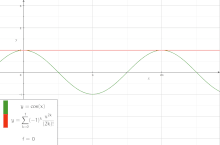级数展开

在数学中,级数展开是将一个函数展开成级数,或无穷和的形式。它是一种计算仅靠基本运算符(加、减、乘、除)无法表达的函数的方法。
由此产生的级数往往可以通过仅取有限项,产生近似。序列中使用的项越少,近似就越简单。由于省略的部分和产生的不精确通常可以用包含大O符号的方程来描述。对于非解析函数,开放区间上的级数展开是一个近似值。
级数展开的种类
这里介绍了若干种级数展开的方式:
泰勒级数是基于函数在一个点上的导数的幂级数。具体来说,如果函数 在附近是无限可微的,那么在该点周围的泰勒级数为,按照惯例。的麦克劳林级数是其在处的泰勒数列。洛朗级数是泰勒级数的延伸,允许负指数项;它的形式是 并在环内收敛。
广义狄利克雷级数具有 的形式。它的一个重要特例是狄利克雷级数。傅里叶级数将周期函数展开成许多正弦和余弦函数之和。更具体地,一个周期为的函数的傅里叶级数为:
其中系数为:
在声学中,基音和泛音共同构成了一个傅里叶数列的例子。
斯特林公式是对数Γ函数的一个近似值。
例子
下式为的泰勒级数:
Text is available under the CC BY-SA 4.0 license; additional terms may apply.
Images, videos and audio are available under their respective licenses.


















